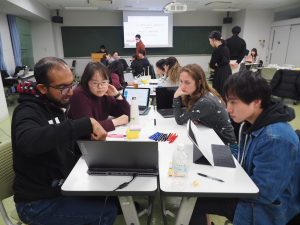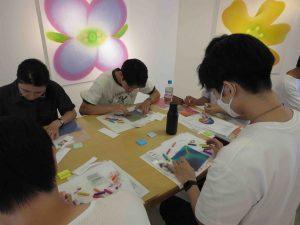The third session of the Leadership Core Program, which is part of the ToTAL course “Fundamental Group Work for Leadership”, was held on June 14, 2025.
| Facilitators | Kenshu Kamura, Representative of NPO Ba to Tsunagari Labo home’s vi Yuri Matsuzaki, Specially Appointed Associate Professor, Academy for Leadership, Institute of Science Tokyo |
| Date and Time | Saturday, June 14, 2025, 10:00–15:00 |
| Venue | Room S4-202, 2nd Floor, South Building 4, Ookayama Campus |
[Overview] Brainstorming and Forced Idea Generation (Morning Session)
Activity 1: Portrait Drawing Workshop
■Overview: A workshop to nurture the mindset of “just try drawing” without worrying about others’ judgments.
■Details: We looked at the faces of our group members and drew portraits based on how we felt. When we were children, drawing like this was easy. But as adults, we often stop because we worry about what others will think. This activity showed us that the most important thing is not how good the drawing is, but just trying to draw. This attitude is important as the first step when we create something new. We learned how hard and important it is to express our ideas freely without worrying about other people’s opinions.
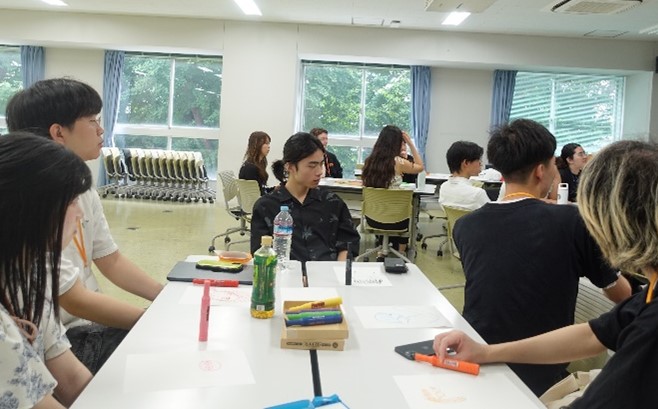
Activity 2: Idea Generation Using Circles
■Overview: A workshop to emphasize the importance of quantity over quality in idea generation.
■Details: We used sheets of paper filled with many circles and tried to come up with as many ideas as possible within a time limit. Instead of aiming for perfect drawings, we focused on quickly turning our ideas into shapes by keeping our hands moving. Through this, we experienced the core of brainstorming—valuing quantity over quality in the early stages of idea generation.
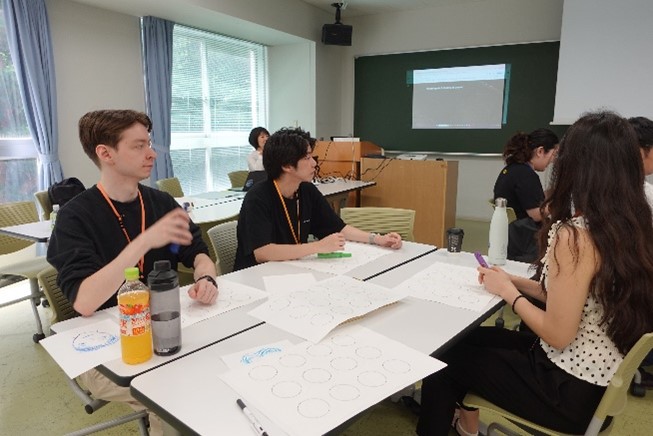
Activity 3: Planning the Best/Worst School Trip
■Overview: A workshop to practice brainstorming and forced idea generation.
■Details: We worked on the forced idea generation activity in groups using the contrasting themes of “the best school trip” and “the worst school trip.” Many participants were able to come up with ideas easily for the worst trip, but struggled more with the best trip. This showed how we often overthink when trying to create something “good” or “correct,” making brainstorming more difficult. Afterward, we exchanged plans with other groups and improved each other’s ideas. Through this, we experienced the power of accepting others’ ideas positively and building on them, which led to unique and creative concepts we wouldn’t have thought of alone.
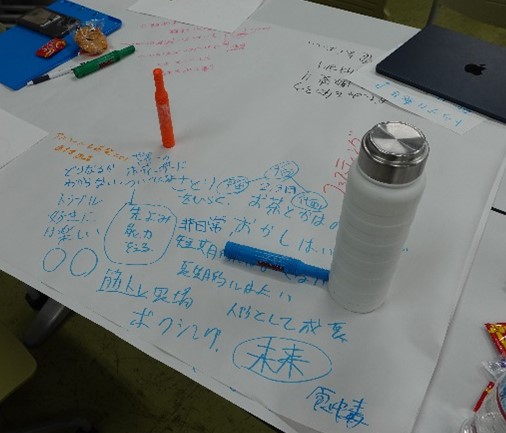
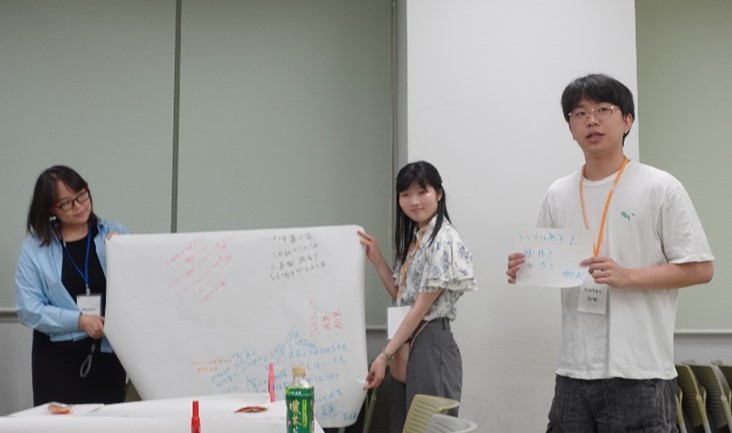
[Overview] Improvement and Innovation (Afternoon Session)
Activity 4: Hamster Plush Toy Relay
■Overview: A workshop to learn that continuous improvement and innovation are possible through competition.
■Details: Participants were divided into two groups of eight, competing to pass a plush toy in a specified order as quickly as possible. After the first round, both the winning and losing teams aimed to improve their methods. After hearing that previous teams had achieved significantly faster times, both groups challenged their assumptions and innovated further. As a result, they drastically improved their times in the third round, learning that even when limits seem reached, finding better new strategies is still possible.
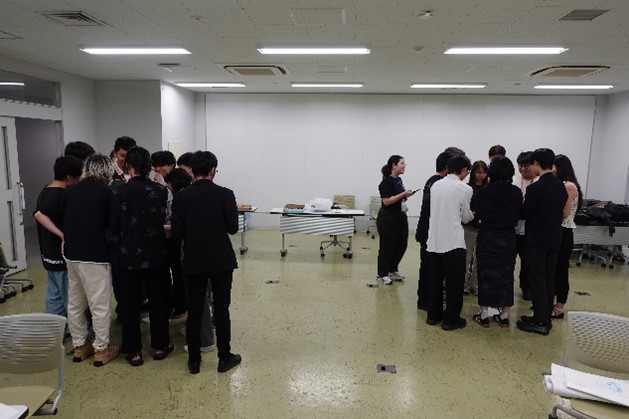
Activity 5: Idea Generation through Reversal and amplification
■Overview: A workshop to acquire creative thinking methods by reversing or amplifying common assumptions.
■Details: Using the theme “university,” participants explored ideas by reversing (doing the opposite) or amplifying (taking to extremes) various elements. For example, referring to a fast-food chain that offers free meals if not served within a time limit, participants considered how university systems might be radically reimagined.
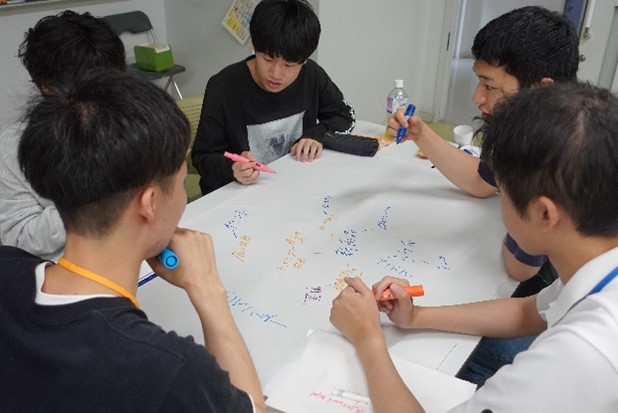
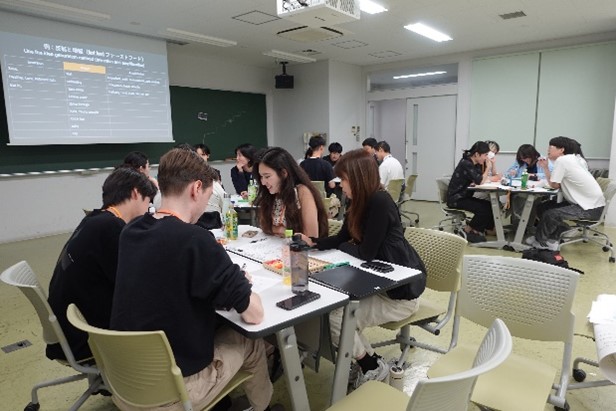
Activity 6: Newspaper about future
■Overview: A workshop to develop the ability to clearly communicate novel ideas.
■Details: Each participant selected one interesting idea from Workshop 5 (Idea Generation through Reversal and Amplification) and wrote a newspaper article about future based on it. We focused on making catchy headlines, clear structure, and easy-to-understand writing. Finally, everyone shared their articles within the group. Sharing within groups fostered not only creative thinking but also the importance of logic, organization, and audience perspective in communication.
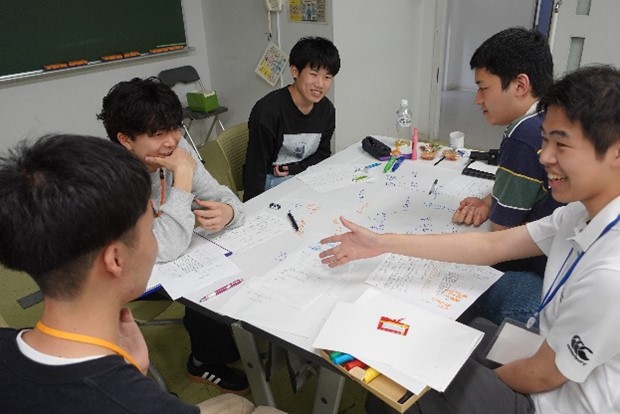
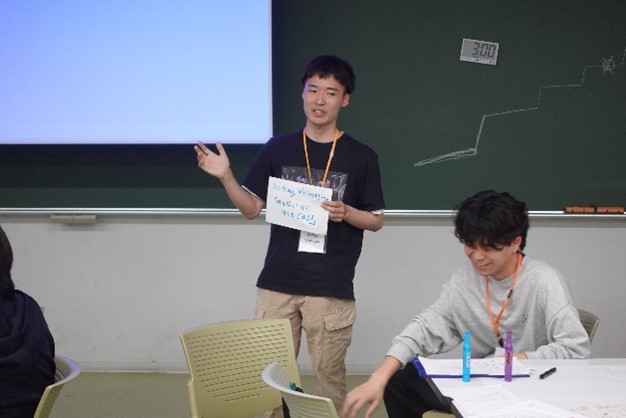
Reflections
Through this program, I learned that in the early stages of brainstorming, it is important to focus on “quantity over quality” and “affirmation over evaluation” in order to unlock creativity. I also experienced being aware of others and engaging in competition can lead to improvements and innovations that go beyond existing limits. Moreover, I realized the importance not only of generating ideas, but also of shaping and expressing them in a way that clearly communicates to others. Through the course of the day, I gained practical experience with a “cycle of creativity and improvement” that can be applied in research, business, education, and many other fields. Every workshop was meaningful and enjoyable. It was a valuable experience where I could truly feel my own growth, and I would like to participate again. I highly recommend it to others as well.
Additional Note
This time, I joined this workshop as an observer. The participants in each group were able to enjoy the workshops together. If you have even a slight interest in “enhancing brainstorming skills” or “developing expressive abilities,” this workshop offers experiences rarely found in regular classes. I highly encourage you to participate! It’s a highly recommended program, even for beginners.
Written by:
Yuta Murao, D1, School of Life Science and Technology, ToTAL 6th Cohort

